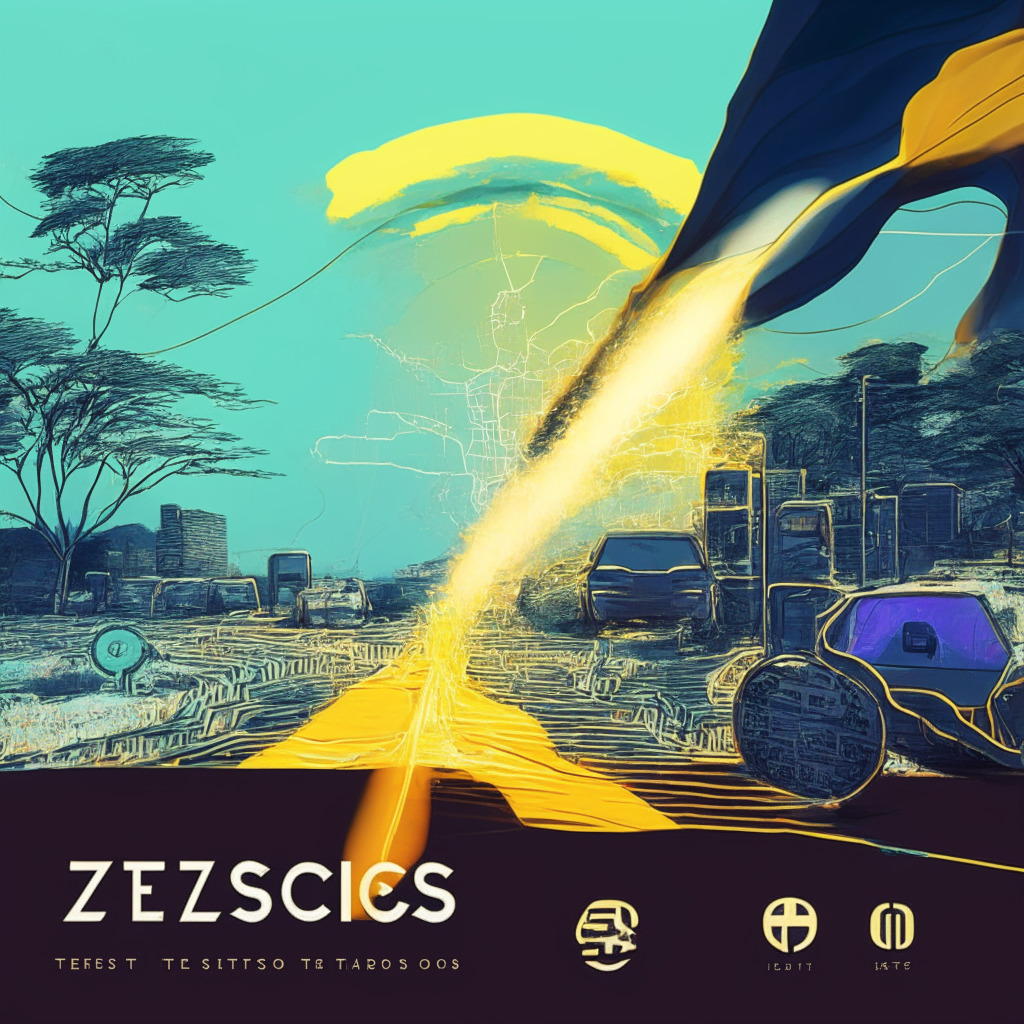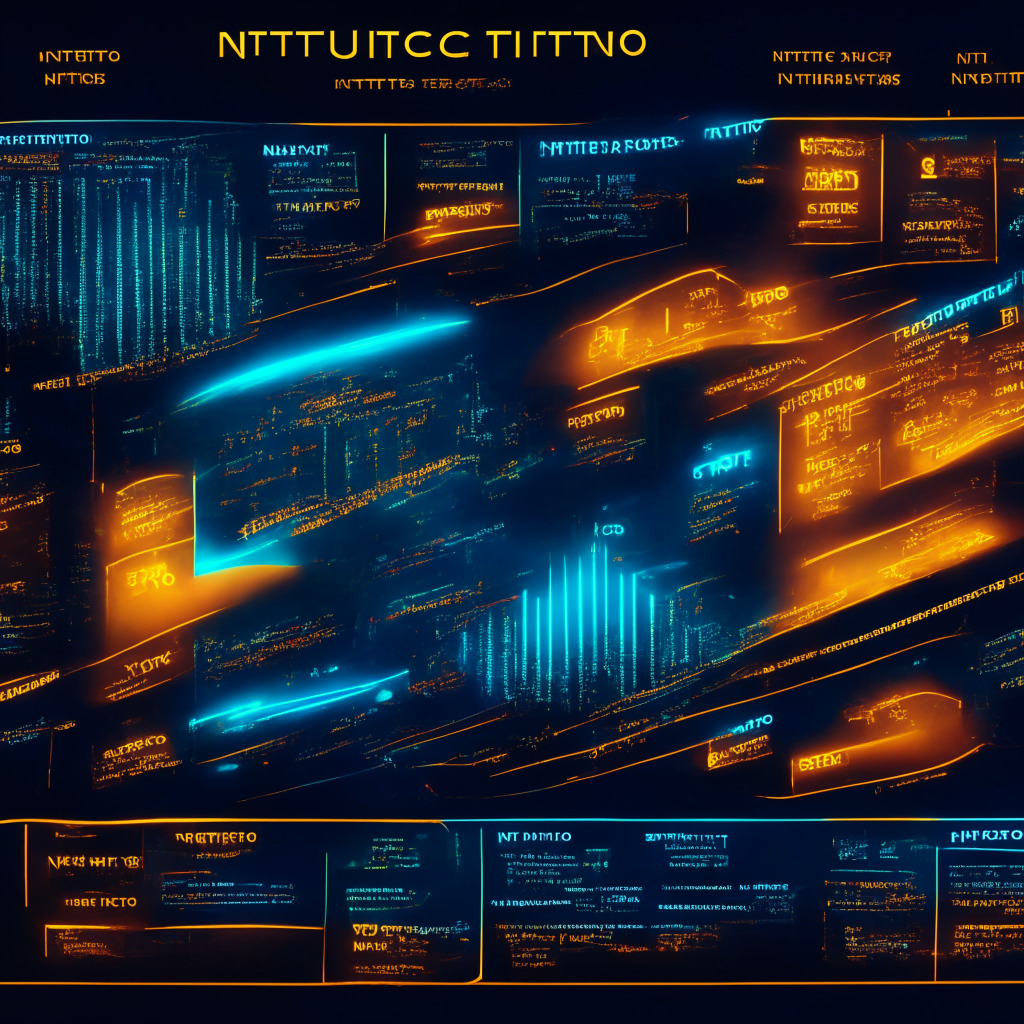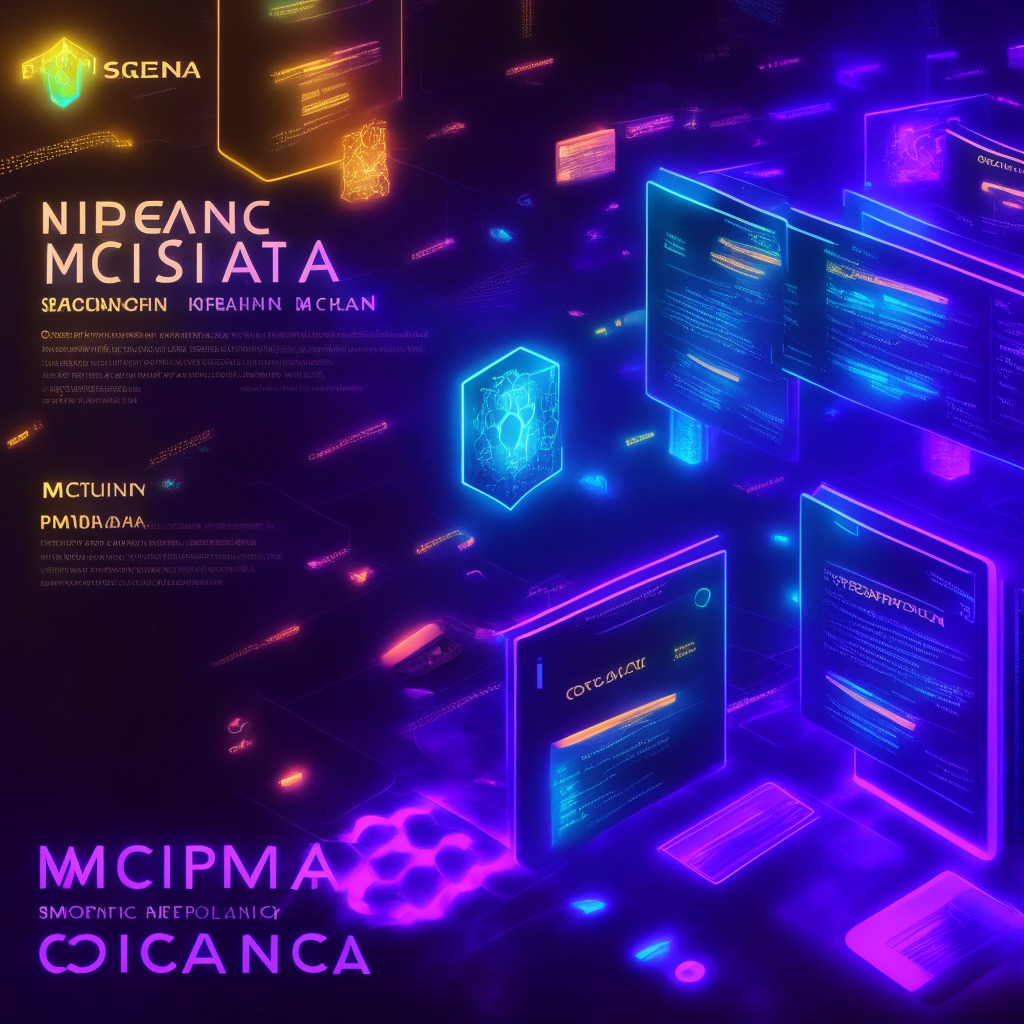As AI advances, concerns grow about scammers exploiting this technology for fraud and deception, such as using AI-powered tools on social media platforms and AI-driven chatbots for promoting fake tokens and ICOs. This challenges the concept of social proof-of-work and puts vulnerable individuals within the crypto sphere at risk.
Category: Technology
Fableborne: A Promising Blockchain Gaming Venture or Another Crypto Hype?
Web3 gaming studio Pixion Games raised $5.5 million in seed funding for its blockchain-based game Fableborne, backed by prominent investors like Avalanche Foundation. The action-based RPG operates on the Avalanche network, featuring on-chain assets. Fableborne showcases the potential of crypto gaming despite a highly competitive market and current crypto investment slowdown.
Tezos Nairobi Upgrade: Improved Speed and Fees vs. Low Usage and XTZ Decline
The Tezos blockchain’s 14th upgrade, “Nairobi,” offers transaction speeds up to eight times faster and introduces a new fee mechanism based on network usage. However, Tezos’ low usage and the XTZ token’s underwhelming performance raise questions about its long-term viability in the competitive blockchain ecosystem.
Expanding Cryptocurrency Custody: Fireblocks Partners with Cloud Giants, Security Concerns Linger
Cryptocurrency custody technology provider Fireblocks has expanded its support to cloud service providers including Amazon Web Services, Google Cloud Platform, Alibaba Cloud, Thales, and Securosus, aiming to cater to banks using on-premise and cloud-based IT infrastructures.
Revolutionizing Crypto Basis Trading: Unveiling OKX’s Nitro Spreads & Its Impact on OTC Markets
OKX introduces “Nitro Spreads,” enhancing its OTC institutional liquid marketplace by allowing one-click complex basis trades. This feature, applicable to spot, perpetual, and futures contracts on the exchange, offers users efficiency, convenience, and minimizes price slippage.
Nodeless Lightning Processor: Revolutionizing Bitcoin or Regulatory Risk?
Nodeless, a Lightning payment processor, simplifies Bitcoin transactions for merchants without requiring personal information (non-KYC). However, the centralized nature of Nodeless could bring regulatory risks. The company plans to operate in El Salvador for a lenient approach to cryptocurrencies. Despite concerns, Nodeless captures growing demand for accessible, innovative blockchain solutions.
Riot Platforms’ Massive ASIC Order: Revolutionizing Bitcoin Mining or Threat to Sustainability?
Riot Platforms acquires 33,280 mining rigs from MicroBT, increasing its hashrate capacity to 20.1 EH/s. The machines, designed for immersion cooling systems, will be deployed by Q1 2024. This groundbreaking development occurs as questions about optimizing efficiency and addressing environmental concerns in the mining industry arise.
US Secret Service NFT Collection: Investigative Approach or Creative PR?
The United States Secret Service created a unique nonfungible token (NFT) collection on OpenSea to better understand how NFTs work and display their interest in the broader crypto ecosystem. This initiative aims to make the agency more approachable for the public, especially crypto enthusiasts, and emphasize their dedication to the crypto landscape.
Swiss CBDC Pilot Project: Balancing Innovation and Skepticism Among Authorities
The Swiss National Bank (SNB) announced plans to launch a wholesale central bank digital currency (wCBDC) pilot project with real money, testing real transactions with market participants. This move indicates a positive approach towards blockchain technology and digital currency adoption, but skepticism remains among some Swiss officials about retail CBDC issuance.
Celebrities Join Forces for NFT Collection Benefiting AIDS Research: Potential and Controversy
Celebrities Kendall Jenner, Kate Moss, J Balvin, Jeff Koons, and Baz Luhrmann join a panel selecting winning pieces for an NFT collection benefiting The Foundation for AIDS Research (amfAR). The initiative aims to support emerging artists and raise funds for AIDS research, showcasing the growing interest in blockchain technology and digital art for significant causes.
Generative AI: Revolutionizing Creativity or Fueling Ethical Dilemmas?
Generative AI, enabling machines to create original content, has impacted industries like art, music, and storytelling but raises ethical concerns, including deepfake content and perpetuating biases. Addressing these issues requires responsible AI development to ensure beneficial and ethical adoption.
AI in Congress: Striking Balance Between Privacy & Innovation in Legislative Process
The U.S. House of Representatives has limited the use of OpenAI’s ChatGPT to ensure privacy preservation, authorizing only the ChatGPT Plus version under specific conditions. As AI technology advances, striking a balance between AI-driven innovations and privacy protection becomes crucial. Establishing a regulatory framework for AI applications is necessary to support its transformative potential without compromising privacy.
AI and Crypto Synergy: Unlocking Transparency, Decentralization, and User Control
The integration of AI and crypto has the potential to revolutionize both industries, fostering greater transparency, user control, and decentralization. Industry insiders suggest that AI could open up new opportunities for the blockchain sector, driving its resurgence and bringing additional real-world use cases.
SAP Tests USDC Stablecoin Payments: Examining Blockchain’s Impact on Cross-Border Transactions
SAP is testing cross-border stablecoin payments using USDC on Ethereum’s Goerli testnet, aiming to improve international financial transactions. Their blockchain-based solution may offer a more efficient, transparent and cost-effective alternative to traditional cross-border payments, eliminating intermediaries and reducing fees.
Earning Crypto While Gaming: The Bling Revolution and Its Impact on Adoption
Bling Financial offers mobile gamers a chance to earn small amounts of Bitcoin or Ethereum while playing games like Sweet Bitcoin or Ethereum Blast. This innovative approach bridges the gap between gaming and crypto communities, introducing a new demographic to cryptocurrencies and increasing adoption.
Failed Crypto Boss MasterClass: Examining Bankman-Fried’s Controversial Downfall
Sam Bankman-Fried’s MasterClass tutorial was scrapped amid controversies and connections with Hollywood agent-turned-investor Michael Kives. The crypto boss faces fraud charges related to FTX’s collapse, highlighting the potential dangers and pitfalls within the cryptocurrency industry.
The Future of Tokenization: CBDCs, Decentralization, and Global Monetary Landscape
The IMF and BIS published reports discussing the future of the monetary system and the potential impact of crypto and central bank digital currencies (CBDCs) on tokenization. Tokenization represents claims digitally on a programmable platform, integrating records of underlying assets with their transfer rules and logic. The reports emphasize tokenized CBDCs’ role in maintaining settlement stability and “singleness of money.”
Fordefi Integrates with Solana: The Future of Institutional MPC Wallets and Security Debate
Institutional MPC wallet company Fordefi plans to integrate its native wallet with Solana-based applications and protocols. Fordefi’s advanced security features, such as transaction simulation and policy management tools, cater to institutional needs and have attracted clients like Keyrock and DeFiance Capital. The success of this integration will depend on the market’s value and adaptation to advanced security measures.
Swiss CBDC Pilot Program: Enthusiasm, Challenges, and the Future of Digital Currencies
Swiss National Bank (SNB) Chairman Thomas Jordan announced an experimental central bank digital currency (CBDC) for wholesale payments on the SIX Digital Exchange. Intended for financial institutions, this pilot program aims to test real transactions with market participants, joining 18 countries piloting CBDC technology worldwide.
Bitcoin Heated Pools and Beyond: Unleashing Crypto Mining’s Creative Potential
Imagine taking a dip in water warmed by bitcoin miners; a unique system uses heat exchangers to transfer the heat produced from ASICs to the water. Cryptocurrency enthusiasts are finding creative ways to incorporate mining into daily life, from heating pools to powering greenhouses and calming noisy infants.
Blockchain Revolution for Cross-Border Payments: Pros, Cons, and the Main Conflict
SAP, an enterprise software company, is testing blockchain solutions for cross-border payments using stablecoin USDC, potentially addressing international payment challenges. Despite skepticism, progress continues toward overcoming friction points, reducing costs, and increasing ease of use for global transactions through blockchain technology and stablecoins like USDC.
Ethereum-Compatible ZK Stack: The Open-Source Future of Customized Layer-2s & Layer-3s
The ZK Stack, an open-source framework for developing zk-rollups and layer-3 hyperchains, offers Ethereum-compatible, customizable, and secure solutions for developers prioritizing sovereignty. Its modularity, composability, and adaptability make it ideal for a variety of applications, including gaming, decentralized exchanges, and private permissioned chains.
Web3 Gaming’s Critical Crossroads: Quality, Economies, Engagement & Fun Unleashed
Web3 gaming, currently at a critical crossroads, must prioritize game quality, sustainable economies, engagement, and fun to succeed like the mobile gaming market. Enhancing game quality, building sustainable economies, increasing engagement, and crafting fun games will elevate Web3 games and dismantle stigmas.
The Azuki Elementals NFT Release: Expanding the Anime Universe and Fueling Anticipation
Chiru Labs releases 20,000 Azuki Elementals NFTs, expanding its popular Ethereum-based Azuki collection. With a Dutch auction for the remaining Elementals, current Azuki NFT holders get a preferential pre-sale window. The four distinctive kingdoms-themed Elementals continue Azuki’s impressive success in the NFT market.
Exploring Project Guardian: Tokenized Digital Assets and the Future of Finance
The Monetary Authority of Singapore, Bank for International Settlements, and major financial institutions collaborate on Project Guardian, which explores designing open and interoperable networks for tokenized digital assets across asset classes like wealth management, fixed income, and foreign exchange. This project raises questions on accessibility, scalability, and regulatory adaptation.
Reviving Terra Classic: Six Samurai’s Bold Move to Reclaim $580M Ecosystem
Six engineers known as the “Six Samurai” have proposed a revival of the Terra Classic ecosystem, aiming to create independence from its disgraced founder, Do Kwon. Their objectives include providing value during the recovery process and contributing to the Terra Classic blockchain as both developers and long-time community members/investors.
NEAR Foundation and Alibaba Cloud Partnership: Boosting Web3 Growth in Asia and the Middle East
The NEAR Foundation partners with Alibaba Cloud to promote Web3 technology growth in Asia and the Middle East. This collaboration enables a larger pool of developers to create projects using the NEAR protocol and strengthens NEAR’s foothold in the burgeoning Web3 sector.
NEAR Foundation & Alibaba Cloud Partnership: Boosting Web 3 Adoption or Harming Decentralization?
The NEAR Foundation has partnered with Alibaba Cloud to facilitate the growth of Web 3 in Asia and the Middle East. This collaboration offers access to Alibaba Cloud’s developer ecosystem, enables launching new NEAR validators, and provides remote procedure calls and multi-chain indexing, fostering adoption and scalability.
AI-Guided Meditation Coaches: Revolutionizing Wellness or Replacing Human Jobs?
Ogimi, the first AI-guided meditation coach using OpenAI’s ChatGPT technology, offers personalized real-time meditation experiences tailored to users’ needs. The platform aims to provide one-on-one coaching, addressing concerns of AI replacing human coaches and potential misuse with guide rails and content monitoring. Balancing AI benefits and risks remains essential for a harmonious future.
Amazon’s $100M Generative AI Center: Boosting Cloud Services or Raising Privacy Concerns?
Amazon’s cloud unit, AWS, invests $100 million in a generative AI center to enhance cloud infrastructure services capabilities and maintain market leadership. This move aims to bridge the gap between Amazon’s AI experts and clients seeking advanced technology applications, amidst rising competition from Microsoft and Google.
Reviving Terra Luna Classic: Six Samurai’s Ambitious Q3 Spend Proposal & Ecosystem Impact
The Terra Allies’ Six Samurai team aims to revive the Terra Luna Classic (LUNC) ecosystem with a comprehensive Q3 plan and a $116,000 budget. Focusing on crucial milestones like migrating to Columbus-6 and listing Terra Classic on Keplr’s Web Interface, the team demonstrates dedication to innovation in the blockchain space.
AI Meets Blockchain: ChatGPT Plugin for Hedera Ecosystem, Opportunities & Security Concerns
The ChatGPT plugin integration with Hedera network enables secure AI-blockchain interactions, simplified asset management, and decentralized applications (dApps) development, leveraging both AI and blockchain technologies. Despite its benefits, users should remain vigilant about potential security breaches and risks in these evolving industries.































